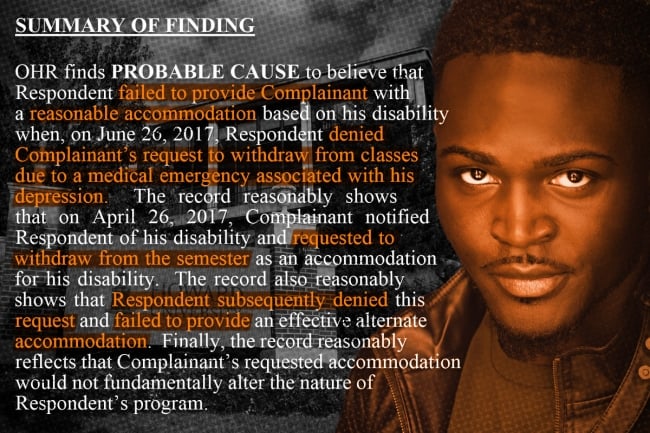You have /5 articles left.
Sign up for a free account or log in.

Durmerrick Ross, pictured above, filed a complaint with the D.C. Office of Human Rights against Howard University for how they handled his mental health crisis in 2017.
Photo illustration by Justin Morrison/Inside Higher Ed | Salwan Georges/The Washington Post via Getty Images | Courtesy of Durmerrick Ross | District of Columbia Office of Human Rights
When Durmerrick Ross left Howard University after a mental health crisis in the middle of his freshman year, he wasn’t sure at first if he wanted to continue there for his sophomore year or transfer to a public college in his home state of Texas. But when he eventually began applying to other colleges as a transfer student, he ran into an unexpected barrier: while he thought he had withdrawn midway through the spring semester, his transcript showed Fs for every class that term.
It was already August 2017 by then—Howard officials had held his transcript due to a tuition processing error on their end—and Ross wasn’t sure any institution would accept him as a transfer student with a grade point average below 2.0.
“As a [high school] senior, I got scholarships from places like Tuskegee University and Prairie View [A&M University],” he recalled. “As a transfer, I was denied, even though those applications were not even a year from each other.”
He didn’t understand why his withdrawal request hadn’t been approved; he had turned in the necessary documents and even received a call asking him to confirm that he was leaving, he said. Administrators told him the process had been initiated but never finalized and asked him to complete the same forms he had back in April.
He asked for support re-filling out the forms—at that point, students could only report withdrawal from the current semester, fall 2017, rather than the semester Ross was trying to retroactively withdraw from—but received no response from administrators.
The experience only exacerbated the depression that had compelled him to leave in the first place, making him wonder whether he’d ever finish his degree.
“By virtue of their mishandling of the situation, they further put me in harm,” he said. “That was a tough time.”
Then one day in October, in the midst of applying to other institutions as a transfer student, Howard’s online portal changed to say that Ross had, indeed, withdrawn successfully the previous spring. He received no notice of the change from the university.
Breaking Down Barriers?
Ross ended up transferring to Texas Southern University, where he earned a degree in communications studies in 2022. Now he is determined to push for changes at Howard in the hopes of making it easier for other students to continue their studies after experiencing a mental health crisis.
His crusade comes at a time when youth mental health issues are at an all-time high; college students are presenting at campus counseling centers with higher rates of trauma and reporting increased social anxiety, and key stressors of the COVID-19 pandemic—including isolation and heightened academic pressure—have not yet returned to pre-pandemic levels. Colleges are trying to meet the moment with new mental health and wellness initiatives, virtual therapy and beefed up counseling-center staffs.
Many have also been forced to grapple with insufficient mental health policies; Yale University came under fire last fall for disallowing mental health leaves of absence, a policy officials re-evaluated after a spate of student suicides. Stanford University, too, changed its leave of absence policy to allow students to continue with classes following incidents in which they are deemed a risk to themselves or others, as well as to make it easier for students who leave to return.
Ross hopes to spur similar changes at Howard, which, like Yale prior to 2023, does not currently have any medical leave policy—for physical or mental illness. To that end, he filed a complaint with the D.C. Office of Human Rights in 2018 alleging that Howard discriminated against him by failing to accommodate his depression when it prevented him from withdrawing.
In September 2023, OHR ultimately found “probable cause” that Howard had not provided Ross with such an accommodation or an acceptable alternative, and the university settled with him for an undisclosed sum. Ross hoped the settlement would also mandate that Howard create a new mental health leave policy, but it only guaranteed him a meeting with Howard officials about a potential policy, which he will have to develop and present himself.
Howard University declined to comment on the settlement. Officials also said they could not comment on Ross’s specific situation due to the Family Educational Rights and Privacy Act.
“Howard University takes students facing health crises, including mental health issues, with the utmost seriousness and has numerous procedures in place to support students facing these issues,” the Office of University Communications told Inside Higher Ed in response to a series of questions.
Ross said he would like to see the university implement four policies: a medical leave of absence policy, a return from medical leave policy, a clarified process for students who want to withdraw for medical reasons, and a revision to the involuntary administrative withdrawal policy.
“My proposal will be aligned with … what is the standard across most universities and colleges,” he said. “There are just so many reasons why you should at the very least have a leave of absence policy for students, especially students who are facing mental health emergencies when, again, we know, our students are facing that more.”
Monica Porter Gilbert, an attorney with the Bazelon Center for Health Law, warned of serious consequences for students at institutions without clear mental health policies. Gilbert represented students who sued Yale and Stanford over their mental health infrastructure.
“What we’ve heard from students at different schools is that sometimes there is a hesitancy to disclose that there are mental health needs, because in some places students are afraid” of how the institution could respond, she said. “When it’s not clear to students that they will be supported, it can lead to hesitancy to access resources. And there’s broad agreement that colleges and universities should encourage students to seek and connect with resources as they need to and should foster environments where students feel safe to do so.”
Institutional Supports
The Howard Office of University Communications told Inside Higher Ed that, since 2017, the university has introduced and bolstered a number of new initiatives aimed at supporting student mental health, including the Office of Student Advocacy and Support, which pairs students suffering from mental health challenges with case managers who can help them succeed academically. Similarly, the university implemented the Bison Intervention Team, a cross-departmental group that “mitigates and addresses student challenges by ensuring they can get the support they need from University staff and resources.”
Since Ross publicized his efforts in the student newspaper, he has heard from current Howard students who are also struggling to resume their studies after suffering a mental health crisis. A graduating senior, who asked to remain anonymous out of fear of retribution from the university, told Inside Higher Ed that after she was hospitalized for a suicide attempt, she received notice that she was being immediately withdrawn from Howard and barred from campus. Her scholarship was canceled too, she said.
She was alarmed at the university’s aggressive response to her mental health crisis, she said, which came while she was still dealing with depression and the trauma of her hospital stay. Though she successfully appealed her ban from campus and the loss of her scholarship, the involuntary withdrawal stood. She had to reapply to stay at the institution, which she chose to do because of the friends she’d made on campus.
“I don’t think any student should be automatically involuntarily withdrawn from school because they had a mental health crisis. I don’t think that should be the policy,” she said, stressing that universities need to be more flexible in supporting students with mental illnesses.
Howard told Inside Higher Ed that the university “does not take lightly instances where a student is involuntarily withdrawn because their mental, emotional and/or physical welfare is in jeopardy, or where their behavior and conduct present an imminent danger or threat to the individual student, other members of the University Community or the University Community at-large.”
In instances where such a measure is taken, students are offered a hearing where they can make their case for staying, the communications office wrote. The anonymous student said that the hearing she attended seemed to leave no room for her to advocate for herself.
“The whole hearing process was kind of unnecessary … I felt like they had made a decision from the beginning,” she said.
The communications office also told Inside Higher Ed that it offers many options for students whose mental illness is impacting their academic work, including allowing them to take incomplete course grades and to receive academic accommodations.
Ross noted, however, that the university did not offer to reach out to professors on his behalf, something he could not do on his own from Texas, where he was undergoing psychiatric treatment.
Kayla Gibson, a Howard student who was hospitalized earlier this semester, also faced challenges getting her professors to give her incompletes or allow her to finish her work remotely. A third party approached the professors on her behalf to request the accommodations, but none agreed to do so. Now she has no choice but to withdraw.
“It’s really frustrating just knowing that I could be graduating were it not for this situation being the way that it is,” she said.
Earlier in her time at Howard, she had dealt with a situation like Ross’s, where a doctor recommended she take a medical leave. Instead, she was told Howard lacks a medical withdrawal policy and that she would have to fully withdraw and reapply when she wanted to return.
She believes Howard would benefit greatly from an official withdrawal policy. Ross, too, hopes establishing such a policy would give students more options and support during a mental health crisis, when they most need it.
“I think we just have to do more, and that means real policies, real practices that are efficient and really help students,” he said. “I hate that the burden of correcting the university’s inefficient policies is put on me and put on students, but that’s what it has to be … at any moment in the last seven years, if I had let it go, it would never be where it is now.”








